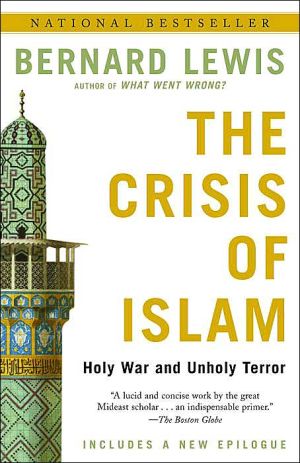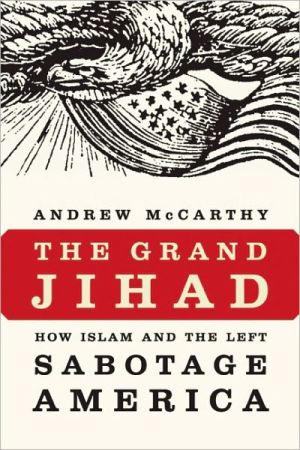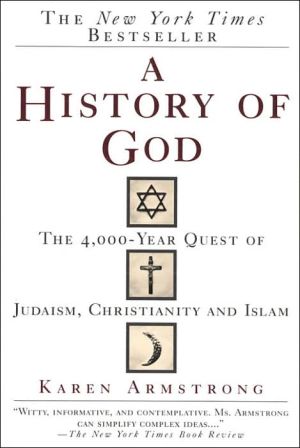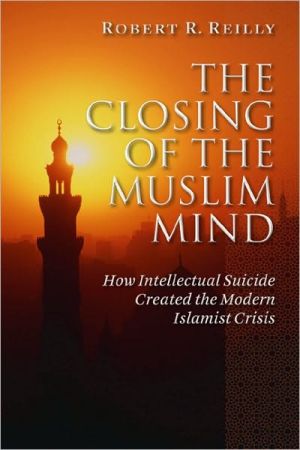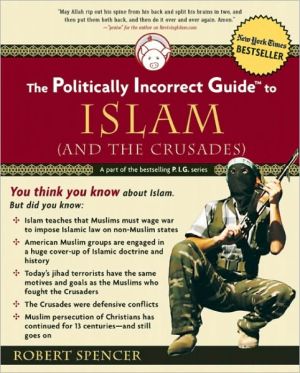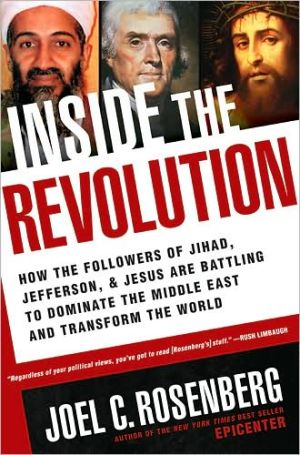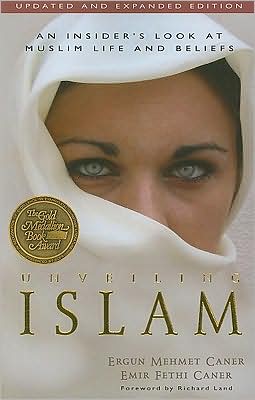The Crisis of Islam: Holy War and Unholy Terror
In his first book since What Went Wrong? Bernard Lewis examines the historical roots of the resentments that dominate the Islamic world today and that are increasingly being expressed in acts of terrorism. He looks at the theological origins of political Islam and takes us through the rise of militant Islam in Iran, Egypt, and Saudi Arabia, examining the impact of radical Wahhabi proselytizing, and Saudi oil money, on the rest of the Islamic world.\ The Crisis of Islam ranges widely through...
Search in google:
In his first book since What Went Wrong? Bernard Lewis examines the historical roots of the resentments that dominate the Islamic world today and that are increasingly being expressed in acts of terrorism. He looks at the theological origins of political Islam and takes us through the rise of militant Islam in Iran, Egypt, and Saudi Arabia, examining the impact of radical Wahhabi proselytizing, and Saudi oil money, on the rest of the Islamic world.The Crisis of Islam ranges widely through thirteen centuries of history, but in particular it charts the key events of the twentieth century leading up to the violent confrontations of today: the creation of the state of Israel, the Cold War, the Iranian Revolution, the Soviet defeat in Afghanistan, the Gulf War, and the September 11th attacks on the United States.While hostility toward the West has a long and varied history in the lands of Islam, its current concentration on America is new. So too is the cult of the suicide... The New York Times The Crisis of Islam is rich with the eloquence and erudition for which Lewis has become known and admired, even by his critics. Where this book is at its best is in showcasing his knowledge of the history, historiography, jurisprudence and customs of Islamic society in the Middle East. For this reason, his chapter ''The House of War,'' describing the theological basis for jihad and martyrdom, as well as their distortion by some fundamentalists to justify terrorism, is a gem. So too is ''Double Standards,'' which deals with America's own sordid relationship with Middle East tyrants. — Kenneth M. Pollack
Chapter 1\ Defining Islam\ \ It is difficult to generalize about Islam. To begin with, the word itself is commonly used with two related but distinct meanings, as the equivalents both of Christianity and of Christendom. In the one sense it denotes a religion, a system of belief and worship; in the other, the civilization that grew up and flourished under the aegis of that religion. The word Islam thus denotes more than fourteen centuries of history, a billion and a third people, and a religious and cultural tradition of enormous diversity. Christianity and Christendom represent a greater number and a longer period-more than 2 billion people, more than twenty centuries, and even greater diversity. Nevertheless, certain generalizations can be and are made about what is variously called Christian, Judeo-Christian, post-Christian, and-more simply-Western civilization. While generalizing about Islamic civilization may be difficult and at times in a sense dangerous, it is not impossible and may in some ways be useful.\ In space, the realm of Islam extends from Morocco to Indonesia, from Kazakhstan to Senegal. In time it goes back more than fourteen centuries, to the advent and mission of the Prophet Muhammad in Arabia in the seventh century c.e. and the creation under him of the Islamic community and state. In the period which European historians see as a dark interlude between the decline of ancient civilization-Greece and Rome-and the rise of modern civilization-Europe, Islam was the leading civilization in the world, marked as such by its great and powerful kingdoms, its rich and varied industry and commerce, its original and creative sciences and letters. Islam, far more than Christendom, was the intermediate stage between the ancient East and the modern West, to which it contributed significantly. But during the past three centuries, the Islamic world has lost its dominance and its leadership, and has fallen behind both the modern West and the rapidly modernizing Orient. This widening gap poses increasingly acute problems, both practical and emotional, for which the rulers, thinkers, and rebels of Islam have not yet found effective answers.\ Islam as a religion is in every respect far closer to the Judeo-Christian tradition than to any of the great religions of Asia, such as Hinduism, Buddhism, or Confucianism. Judaism and Islam share the belief in a divine law that regulates all aspects of human activity, including even food and drink. Christians and Muslims share a common triumphalism. In contrast to the other religions of humanity, including Judaism, they believe that they alone are the fortunate recipients and custodians of God's final message to humanity, which it is their duty to bring to the rest of the world. Compared with the remoter religions of the East, all three Middle Eastern religions-Judaism, Christianity, and Islam-are closely related and indeed appear as variants of the same religious tradition.\ Christendom and Islam are in many ways sister civilizations, both drawing on the shared heritage of Jewish revelation and prophecy and Greek philosophy and science, and both nourished by the immemorial traditions of Middle Eastern antiquity. For most of their joint history, they have been locked in combat, but even in struggle and polemic they reveal their essential kinship and the common features that link them to each other and set them apart from the remoter civilizations of Asia.\ But as well as resemblances, there are profound disparities between the two, and these go beyond the obvious differences in dogma and worship. Nowhere are these differences more profound-and more obvious-than in the attitudes of these two religions, and of their authorized exponents, to the relations between government, religion, and society. The Founder of Christianity bade his followers "render unto Caesar the things which are Caesar's; and unto God the things which are God's" (Matt. XXII:21)-and for centuries Christianity grew and developed as a religion of the downtrodden, until with the conversion to Christianity of the emperor Constantine, Caesar himself became a Christian and inaugurated a series of changes by which the new faith captured the Roman Empire and transformed its civilization. The Founder of Islam was his own Constantine, and founded his own state and empire. He did not therefore create-or need to create-a church. The dichotomy of regnum and sacerdotium, so crucial in the history of Western Christendom, had no equivalent in Islam. During Muhammad's lifetime, the Muslims became at once a political and a religious community, with the Prophet as head of state. As such, he governed a place and a people, dispensed justice, collected taxes, commanded armies, waged war and made peace. For the formative first generation of Muslims, whose adventures are the sacred history of Islam, there was no protracted testing by persecution, no tradition of resistance to a hostile state power. On the contrary, the state that ruled them was that of Islam, and God's approval of their cause was made clear to them in the form of victory and empire in this world.\ In pagan Rome, Caesar was God. For Christians, there is a choice between God and Caesar, and endless generations of Christians have been ensnared in that choice. In Islam, there was no such painful choice. In the universal Islamic polity as conceived by Muslims, there is no Caesar but only God, who is the sole sovereign and the sole source of law. Muhammad was His Prophet, who during his lifetime both taught and ruled on God's behalf. When Muhammad died in 632 c.e., his spiritual and prophetic mission, to bring God's book to mankind, was completed. What remained was the religious task of spreading God's revelation until finally all the world accepted it. This was to be achieved by extending the authority and thus also the membership of the community which embraced the true faith and upheld God's law. To provide the necessary cohesion and leadership for this task, a deputy or successor of the Prophet was required. The Arabic word khalž¯fa was the title adopted by the Prophet's father-in-law and first successor, Abü Bakr, whose accession to the headship of the Islamic community marked the foundation of the great historic institution of the caliphate.\ Under the caliphs, the community of Medina, where the Prophet had held sway, grew in barely a century into a vast empire, and Islam became a world religion. In the experience of the first Muslims, as preserved and recorded for later generations, religious truth and political power were indissolubly associated: the first sanctified the second, the second sustained the first. The Ayatollah Khomeini once remarked that "Islam is politics or it is nothing." Not all Muslims would go that far, but most would agree that God is concerned with politics, and this belief is confirmed and sustained by the shari'a, the Holy Law, which deals extensively with the acquisition and exercise of power, the nature of legitimacy and authority, the duties of ruler and subject, in a word, with what we in the West would call constitutional law and political philosophy.\ The long interaction between Islam and Christianity and the many resemblances and mutual influences between the two have sometimes led observers to overlook some significant differences. The Qur'an, it is said, is the Muslim Bible; the mosque is the Muslim church; the ulema are the Muslim clergy. All three statements are true, yet all three are seriously misleading. The Old and New Testament both consist of collections of different books, extending over a long period of time and seen by the believers as embodying divine revelation. The Qur'an, for Muslims, is a single book promulgated at one time by one man, the Prophet Muhammad. After a lively debate in the first centuries of Islam, the doctrine was adopted thet the Qur'an itself is uncreated and eternal, divine and immutable. This has become a central tenet of the faith.\ The mosque is indeed the Muslim church in the sense that it is a place of communal worship. But one cannot speak of "the Mosque" as one speaks of "the Church"-of an institution with its own hierarchy and laws, in contrast to the state. The ulema (in Iran and in Muslim countries influenced by Persian culture known as mollahs) may be described as a clergy in the sociological sense, in that they are professional men of religion, accredited as such by training and certification. But there is no priesthood in Islam-no priestly mediation between God and the believer, no ordination, no sacraments, no rituals that only an ordained clergy can perform. In the past, one would have added that there are no councils or synods, no bishops to define and inquisitors to enforce orthodoxy. At least in Iran, this is no longer entirely true.\ The primary function of the ulema-from an Arabic word meaning "knowledge"-is to uphold and interpret the Holy Law. From late medieval times, something like a parish clergy emerged, ministering to the needs of ordinary people in cities and villages, but these were usually separate from and mistrusted by the ulema, and owed more to mystical than to dogmatic Islam. In the later Islamic monarchies, in Turkey and Iran, a kind of ecclesiastical hierarchy appeared, but this had no roots in the classical Muslim tradition, and members of these hierarchies never claimed, still less exercised, the powers of Christian prelates. In modern times there have been many changes, mainly under Western influences, and institutions and professions have developed which bear a suspicious resemblance to the churches and clerics of Christendom. But these represent a departure from classical Islam, not a return to it.\ If one may speak of a clergy in a limited sociological sense in the Islamic world, there is no sense at all in which one can speak of a laity. The very notion of something that is separate or even separable from religious authority, expressed in Christian languages by terms such as lay, temporal, or secular, is totally alien to Islamic thought and practice. It was not until relatively modern times that equivalents for these terms existed in Arabic. They were borrowed from the usage of Arabic-speaking Christians or newly invented.\ From the days of the Prophet, the Islamic society had a dual character. On the one hand, it was a polity-a chieftaincy that successively became a state and an empire. At the same time, on the other hand, it was a religious community, founded by a Prophet and ruled by his deputies, who were also his successors. Christ was crucified, Moses died without entering the promised land, and the beliefs and attitudes of their religious followers are still profoundly influenced by the memory of these facts. Muhammad triumphed during his lifetime, and died a sovereign and a conqueror. The resulting Muslim attitudes can only have been confirmed by the subsequent history of their religion. In Western Europe, barbarian but teachable invaders came to an existing state and religion, the Roman Empire and the Christian Church. The invaders recognized both, and tried to serve their own aims and needs within the existing structures of Roman polity and Christian religion, both using the Latin language. The Muslim Arab invaders who conquered the Middle East and North Africa brought their own faith, with their own scriptures in their own language; they created their own polity, with a new set of laws, a new imperial language, and a new imperial structure, with the caliph as supreme head. This state and polity were defined by Islam, and full membership belonged, alone, to those who professed the dominant faith.\ The career of the Prophet Muhammad, in this as in all else the model whom all good Muslims seek to emulate, falls into two parts. In the first, during his years in his birthplace, Mecca (?570-622), he was an opponent of the reigning pagan oligarchy. In the second, after his move from Mecca to Medina (622-632), he was the head of a state. These two phases in the Prophet's career, the one of resistance, the other of rule, are both reflected in the Qur'an, where in different chapters, the believers are enjoined to obey God's representative and to disobey Pharaoh, the paradigm of the unjust and tyrannical ruler. These two aspects of the Prophet's life and work inspired two traditions in Islam, the one authoritarian and quietist, the other radical and activist. Both are amply reflected, on the one hand in the development of the tradition, on the other in the unfolding of events. It was not always easy to determine who was God's representative and who was Pharaoh; many books were written, and many battles fought, in the attempt. The problem remains, and both traditions can be seen very clearly in the polemics and struggles of our own times.\ Between the extremes of quietism and radicalism, there is a pervasive, widely expressed attitude of reserve, even of mistrust, toward government. An example is the sharp difference, in medieval times, of popular attitudes toward the qadi, a judge, and the mufti, a jurisconsult in the Holy Law. The qadi, who was appointed by the ruler, is presented in literature and folklore as a venal, even a ridiculous figure; the mufti, established in medieval Islam by the recognition of his colleagues and the general population, enjoyed esteem and respect. A topos in biographies of pious men-of which we have hundreds of thousands-is that the hero was offered a government appointment and refused. The offer establishes his learning and reputation, the refusal his integrity.\ In Ottoman times there was an important change. The qadi gained greatly in power and authority, and even the mufti was integrated into the public chain of authority. But the old attitude of mistrust of government persisted, and it is frequently expressed in proverbs, folktales, and even high literature.\ For more than a thousand years, Islam provided the only universally acceptable set of rules and principles for the regulation of public and social life. Even during the period of maximum European influence, in the countries ruled or dominated by European imperial powers as well as in those that remained independent, Islamic political notions and attitudes remained a profound and pervasive influence. In recent years there have been many signs that these notions and attitudes may be returning, albeit in modified forms, to their previous dominance.\ It is in the realm of politics-domestic, regional, and international alike-that we see the most striking differences between Islam and the rest of the world. The heads of state or ministers of foreign affairs of the Scandinavian countries and the United Kingdom do not, from time to time, foregather in Protestant summit conferences, nor was it ever the practice of the rulers of Greece, Yugoslavia, Bulgaria, and the Soviet Union, temporarily forgetting their political and ideological differences, to hold regular meetings on the basis of their current or previous adherence to the Orthodox Church. Similarly, the Buddhist states of East and Southeast Asia do not constitute a Buddhist bloc at the United Nations, nor for that matter in any other of their political activities. The very idea of such a grouping, based on religion, in the modern world may seem anachronistic and even absurd. It is neither anachronistic nor absurd in relation to Islam. Throughout the tensions of the Cold War and after, more than fifty Muslim governments-including monarchies and republics, conservatives and radicals, practitioners of capitalism and of socialism, supporters of the Western bloc, the Eastern bloc, and a whole spectrum of shades of neutrality-built up an elaborate apparatus of international consultation and, on many issues, cooperation.\ In September 1969 an Islamic summit conference held in Rabat, Morocco, decided to create a body to be known as the Organization of the Islamic Conference (OIC), with a permanent secretariat in Jedda, Saudi Arabia. This body was duly set up, and it developed rapidly in the 1970s. The OIC was particularly concerned with help to poor Muslim countries, support for Muslim minorities in non-Muslim countries, and the international position of Islam and of Muslims-in the words of one observer, the Islamic rights of man.
MapsIntroductionIDefining Islam3IIThe House of War29IIIFrom Crusaders to Imperialists47IVDiscovering America64VSatan and the Soviets82VIDouble Standards103VIIA Failure of Modernity113VIIIThe Marriage of Saudi Power and Wahhabi Teaching120IXThe Rise of Terrorism137Afterword165Notes167Index173
\ From Barnes & NobleThe acclaimed Middle East scholar and bestselling author of What Went Wrong? examines the historical roots of Islamic extremism and the rampant anti-Americanism permeating the modern-day Muslim world.\ \ \ \ \ The New York TimesThe Crisis of Islam is rich with the eloquence and erudition for which Lewis has become known and admired, even by his critics. Where this book is at its best is in showcasing his knowledge of the history, historiography, jurisprudence and customs of Islamic society in the Middle East. For this reason, his chapter ''The House of War,'' describing the theological basis for jihad and martyrdom, as well as their distortion by some fundamentalists to justify terrorism, is a gem. So too is ''Double Standards,'' which deals with America's own sordid relationship with Middle East tyrants. — Kenneth M. Pollack\ \ \ The Washington PostLewis elegantly and concisely tracks the crisis that is besetting the Muslim world, particularly in the Middle East, soberly explaining that if al Qaeda's leaders "can persuade the world of Islam to accept their views and their leadership, then a long and bitter struggle lies ahead." Bin Laden has acquired a mantle of respectability among certain sections of the Muslim world because other Middle Eastern leaders are seen as compromised. By contrast, his sizable fan base sees him as courageous and incorruptible. For that reason, al Qaeda is not only a terrorist organization but also is morphing into something that approximates a mass movement subscribing to bin Laden's Manichean view that the West really is the enemy of Islam. One can only hope that the conduct of U.S. policy in Iraq, both during the war and afterward, will help to invalidate that view. — Peter Bergen\ \ \ \ \ Publishers WeeklyThis lean, muscular volume, an expansion of Lewis's George Polk Award-winning New Yorker article, sheds much-needed light on the complicated and volatile Middle East. To locate the origins of anti-American sentiment, Islamic scholar Lewis maps the history of Muslim anxiety towards the West from the time of the Crusades through European imperialism, and explains how America's increased presence in the region since the Cold War has been construed as a renewed cry of imperialism. In Islam, politics and religion are inextricable, and followers possess an acute knowledge of their own history dating back to the Prophet Mohammed, a timeline Lewis revisits. By so doing, the bestselling author of What Went Wrong? is able to cogently investigate key issues, such as why the United States has been dubbed the "Great Satan" and Israel the "Little Satan," and how Muslim extremism has taken root and succeeded in bastardizing the fundamental Islamic tenets of peace. Lewis also covers the impact of the Iranian Revolution and American foreign policy towards it, Soviet influence in the region and the ramifications of modernization, making this clear, taut and timely primer a must-read for any concerned citizen. (171 pages; 4 maps) (Apr.) Copyright 2003 Reed Business Information.\ \ \ \ \ Library JournalIn the aftermath of the terrorist attacks of 9/11, myriad articles and books have been published to explain how certain interpretations of Islam have led to the rise of terrorist groups in the Muslim world. In this book, well-known historian Lewis (emeritus, Princeton) continues the debate about the nature of Islam and the implications of politicized Islam for the West. An updated and expanded version of an article he wrote for The New Yorker in November 2001 (for which he received the prestigious George Polk Award), this, in many ways, continues the discussion of topics covered at greater length in the author's recent What Went Wrong?: Western Impact and Middle Eastern Response. Here, Lewis covers the historical roots of contemporary malaise in the Muslim world, the role of Saudi Arabia in Islamic radicalism, and how grievances of radical Muslims against the West and its local allies-real or contrived-are formed. Recommended for large public libraries, but those already holding the more scholarly and historical What Went Wrong? may not need this.-Nader Entessar, Spring Hill Coll., Mobile, AL Copyright 2003 Reed Business Information.\ \ \ \ \ School Library JournalAdult/High School-This is a clear, evenhanded overview of the geopolitical events and religious/cultural belief systems that underlie current tensions between the West and Muslim populations around the globe. An amplification of an article Lewis wrote for the New Yorker, the book spans more than 13 centuries but primary emphasis is on key happenings from the early 20th century to the present. Four pages of maps precede the text, illustrating the dramatic expansion of Islamic influence from the Age of the Caliphs (632-750 C.E.) to its zenith during the Ottoman Empire, followed by attrition and decline through the Age of Imperialism to current boundaries. Among the themes the author tackles are grievances over the modern-day presence of foreigners and "infidels" in holy lands, a discussion he places in historical context to explain the rise of Wahhabism in Saudi Arabia, albeit without excusing the excesses of that movement's adherents. Fundamental differences in the way Islamic societies and the West approach religion and government are elucidated, with commentary on the ramifications for power structures. The issues are complex, but the writing is accessible to older high school students. John L. Esposito's The Oxford Dictionary of Islam (Oxford, 2003) is a valuable companion resource for academically reliable, paragraph-length identification of concepts, geographic place names, and people in the Lewis volume.-Lynn Nutwell, Fairfax City Regional Library, VA Copyright 2003 Reed Business Information.\ \ \ \ \ Kirkus ReviewsThe dean of Islamic studies in America ponders the current state of what is both a religion and a political system, and finds it wanting. Mainstream Islam, at least in its ideal form, is at a far remove from the headline-conquering visions of the Islamicists, whether they be the ayatollahs of Iran or the terrorists of al-Qaeda. But, suggests Lewis (Near Eastern Studies Emeritus/Princeton Univ.; The Multiple Identities of the Middle East, 1999, etc.), the fundamentalists may be well along in shifting the center toward the extreme: "The medieval assassins were an extremist sect, very far from mainstream Islam," he writes. "That is not true of their present-day imitators." Witness, Lewis writes, the ever-growing power of Wahhabism, the conservative strain of Islam that now dominates Saudi Arabia, which Lewis persuasively likens to the Ku Klux Klan. "The custodianship of holy places [in Saudi Arabia] and the revenues of oil have given worldwide impact to what would otherwise have been an extremist fringe in a marginal country," writes Lewis-an extremist fringe among whose notable products is Usama bin Ladin, as Lewis spells it, whose "declaration of war against the United States marks the resumption of the struggle for religious dominance of the world that began in the seventh century." The Islamicists have been able to turn the disaffection of the young and impoverished against not merely America, writes Lewis, but against their home governments, which, after all, have done little to produce healthy societies. (For in every measurable respect of social and material well-being, Lewis writes, the Islamic world lags "ever farther behind the West. Even worse, the Arab nations also lag behind themore recent recruits to Western-style modernity, such as Korea, Taiwan, and Singapore.") Small wonder that so many young Muslims are so eager to fulfill the Quranic obligation of jihad, or "holy war," by striking out against the West-though, Lewis is quick to add, "at no point do the basic texts of Islam enjoin terrorism and murder." Expanded from Lewis's prizewinning New Yorker commentary following 9/11: an illuminating brief overview of Islam today.\ \
